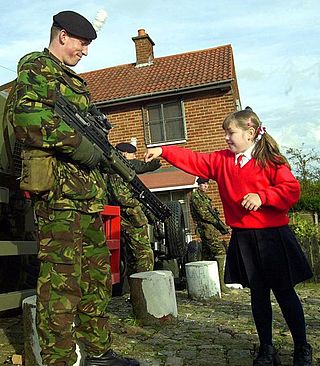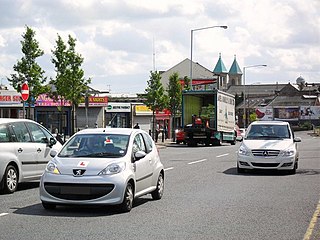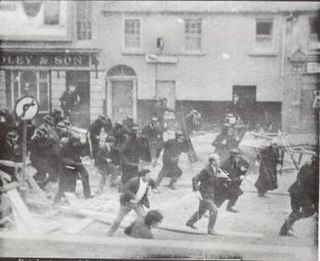
The Royal Ulster Constabulary (RUC) was the police force in Northern Ireland from 1922 to 2001. It was founded on 1 June 1922 as a successor to the Royal Irish Constabulary (RIC) following the partition of Ireland. At its peak the force had around 8,500 officers, with a further 4,500 who were members of the RUC Reserve.

The Police Service of Northern Ireland is the police force that serves Northern Ireland. It is the successor to the Royal Ulster Constabulary (RUC) after it was reformed and renamed in 2001 on the recommendation of the Patten Report.
The Red Hand Defenders (RHD) is an Ulster loyalist paramilitary group in Northern Ireland. It was formed in 1998 by loyalists who opposed the Belfast Agreement and the loyalist ceasefires. Its members were drawn mostly from the Ulster Defence Association (UDA) and Loyalist Volunteer Force (LVF). The name had first been used by Red Hand Commandos dissident Frankie Curry in 1996 and he was the leading figure in what was a somewhat unstructured organization until he was killed in 1999. It is named after the Red Hand of Ulster.

The Holy Cross dispute occurred in 2001 and 2002 in the Ardoyne area of north Belfast, Northern Ireland. During the 30-year conflict known as the Troubles, Ardoyne had become segregated – Ulster Protestants and Irish Catholics lived in separate areas. This left Holy Cross, a Catholic primary school for girls, in the middle of a Protestant area. In June 2001—during the last week of school before the summer break—Protestant loyalists began picketing the school, claiming that Catholics were regularly attacking their homes and denying them access to facilities.

Ardoyne is a working class and mainly Catholic and Irish republican district in north Belfast, Northern Ireland. It gained notoriety due to the large number of incidents during The Troubles.
Rosemary Nelson was an Irish solicitor who was killed with a bomb planted in her car by an Ulster loyalist paramilitary group in 1999.

Patrick Finucane was an Irish lawyer who specialised in criminal defence work. Finucane came to prominence due to his successful challenge of the British government in several important human rights cases during the 1980s. He was killed by loyalist paramilitaries from the Ulster Defence Association.
The Ulster Protestant Volunteers was a loyalist and Reformed fundamentalist paramilitary group in Northern Ireland. They were active between 1966 and 1969 and closely linked to the Ulster Constitution Defence Committee (UCDC) and Ulster Volunteer Force (UVF), established by Ian Paisley and Noel Doherty in 1966.
During the Troubles in Northern Ireland, British security forces were accused by some of operating a "shoot-to-kill" policy, under which suspected paramilitary members were killed without an attempt being made to arrest them. This alleged policy was claimed to be most frequently directed against suspected members of Irish republican paramilitary organisations, such as the Provisional Irish Republican Army (IRA), Official Irish Republican Army (OIRA) and Irish National Liberation Army (INLA). According to an 1985 inquiry by a team of international lawyers titled Shoot to Kill?, undercover security force units were "trained to shoot to kill even where killing is not legally justifiable and where alternative tactics could and should be used." The British government, including the Northern Ireland Office, consistently denied that there was ever a "shoot-to-kill" policy, stating that "like everyone else, the security forces must obey the law and are answerable to the courts for their actions."
The Northern Ireland Human Rights Commission (NIHRC) is a non-departmental public body funded through the Northern Ireland Office but operating independently of government as the national human rights institution (NHRI) for Northern Ireland. It came into existence on 1 March 1999, having been created by the Parliament of the United Kingdom through section 68 of the Northern Ireland Act 1998, in compliance with a commitment made by the UK Government in the Belfast Agreement of 10 April 1998. Its powers were amended by the Justice and Security Act 2007.

Operation Demetrius was a British Army operation in Northern Ireland on 9–10 August 1971, during the Troubles. It involved the mass arrest and internment of people suspected of being involved with the Irish Republican Army (IRA), which was waging an armed campaign for a united Ireland against the British state. It was proposed by the Unionist government of Northern Ireland and approved by the British Government. Armed soldiers launched dawn raids throughout Northern Ireland and arrested 342 in the initial sweep, sparking four days of violence in which 20 civilians, two IRA members and two British soldiers were killed. All of those arrested were Irish republicans and nationalists, the vast majority of them Catholics. Due to faulty and out-of-date intelligence, many were no longer involved in republican militancy or never had links with the IRA. Ulster loyalist paramilitaries were also carrying out acts of violence, which were mainly directed against Catholics and Irish nationalists, but no loyalists were included in the sweep.

During 12–16 August 1969, there was an outbreak of political and sectarian violence throughout Northern Ireland, which is often seen as the beginning of the thirty-year conflict known as the Troubles. There had been sporadic violence throughout the year arising out of the Northern Ireland civil rights campaign, which demanded an end to discrimination against Catholics and Irish nationalists. Civil rights marches had been attacked by Protestant loyalists, and protesters often clashed with the Royal Ulster Constabulary (RUC), the overwhelmingly Protestant police force.
The Hunt Report, or the Report of the Advisory Committee on Police in Northern Ireland, was produced by a committee headed by Baron Hunt in 1969. An investigation was performed into the perceived bias in policing in Northern Ireland against Catholics and other unprofessional practices. The Hunt Report was published on 10 October 1969 and proposed removing the military function from the Royal Ulster Constabulary (RUC), the disbandment of the Ulster Special Constabulary, and their replacement of their military function to a new locally-recruited part time force, which became the Ulster Defense Regiment (UDR). Most of the main proposals of the Hunt Report were implemented, and the B-Specials were disbanded in March 1970. The reaction from some in the Unionist community was aggressive. Constable Victor Arbuckle was shot and killed on the day after the publishing of the Hunt Report when the RUC attempted to disperse a crowd of Unionists that had gathered near the Catholic area of Unity Flats. Constable Arbuckle was the first RUC man killed in what became known as the troubles. The killing of Constable Arbuckle was allegedly carried out by members of the Ulster loyalist paramilitary group the Ulster Volunteer Force. Critics would later state that the UDR displayed problems of bias and a difficulty with maintaining a balance of Catholic/Protestant membership, similar to its forerunners.
The Scottish Human Rights Commission (SHRC) is the national human rights institution for Scotland. It was established by the Scottish Commission for Human Rights Act and started its work in 2008. The Commission is independent of the Scottish and UK Government, and of Parliament.
Daphne Elizabeth Trimble, Baroness Trimble, is a Northern Ireland academic and former politician. Having served as a member of the Equality Commission for Northern Ireland, she was appointed as a part-time Commissioner in the Northern Ireland Human Rights Commission (NIHRC) in 2008, and publicly opposed its proposals for a Bill of Rights for Northern Ireland.
John Oliver Weir is an Ulster loyalist born and raised in the Republic of Ireland. He served as an officer in Northern Ireland's Royal Ulster Constabulary's (RUC) Special Patrol Group (SPG), and was a volunteer in the illegal Ulster Volunteer Force (UVF). As a member of the UVF's Mid-Ulster Brigade led by Robin "the Jackal" Jackson, Weir was a part of the Glenanne gang, a group of loyalist extremists that carried out sectarian attacks mainly in the County Armagh area in the mid-1970s.

From 6 to 11 July 1997 there were mass protests, fierce riots and gun battles in Irish nationalist districts of Northern Ireland. Irish nationalists/republicans, in some cases supported by the Provisional Irish Republican Army (IRA), attacked the Royal Ulster Constabulary (RUC) and British Army. The protests and violence were sparked by the decision to allow the Orange Order to march through a Catholic/nationalist neighbourhood of Portadown. Irish nationalists were outraged by the decision and by the RUC's aggressive treatment of those protesting against the march. There had been a bitter dispute over the march for many years.
Events during the year 2013 in Northern Ireland.
The Ulster University School of Law is a School of Ulster University which is physically located at the Belfast and Magee campuses. The School was also located at the Jordanstown campus prior to moving to the new Belfast City Centre campus in August 2022.
On 12 July 2001, major rioting and civil disorder broke out in Ardoyne, north Belfast, Northern Ireland. In some of the worst rioting in years, 113 police officers were injured in clashes which followed a July 12 parade. Police were attacked when trying clear the path for about 100 Orangemen returning from the parade to go through the Catholic Ardoyne area.







